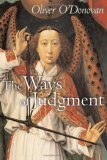Ways of Judgement - and reading groups
Thoughts on books and reading groups Just started a course today at college on 'Social Ethics' with Andrew Cameron. I'm really looking forward to it. I didn't realise until today (shows how on top of my studies I am) that the textbook is Oliver O'Donovan's The Ways of Judgment. I'll try to include posts on it as I work my way through. Love to hear feedback from others who've read it, and/or who might want to read it with me this semester.
Just started a course today at college on 'Social Ethics' with Andrew Cameron. I'm really looking forward to it. I didn't realise until today (shows how on top of my studies I am) that the textbook is Oliver O'Donovan's The Ways of Judgment. I'll try to include posts on it as I work my way through. Love to hear feedback from others who've read it, and/or who might want to read it with me this semester. Also, one of my reading groups has decided to embark upon The Hauerwas Reader by Stanley Hauerwas. Not quite sure which bits we should focus on (at 729 pages, we're assuming we'll be taking the highlights tour: recommendations?).
Also, one of my reading groups has decided to embark upon The Hauerwas Reader by Stanley Hauerwas. Not quite sure which bits we should focus on (at 729 pages, we're assuming we'll be taking the highlights tour: recommendations?).
O'Donovan and Hauerwas: it will be fun to read them simultaneously. This particular reading group has a history of great books, starting back in 2000 and meeting fairly continuously every fortnight or so:*
Jesus and the Victory of God by N. T. Wright
Exclusion and Embrace by Miroslav Volf
The Resurrection of the Son of God by N. T. Wright
Suspicion and Faith by Merold Westphal
The Desire of the Nations by Oliver O'Donovan
God's Politics by Jim Wallis**
Reading groups (especially this one) have been formative in many ways for me over the last five or six years. If you've never been in one, try starting one - it's a great way to read a book and share thoughts. Highlights from other groups have included:
Theology of Hope by Jürgen Moltmann
Church Dogmatics IV/1 by Karl Barth
Adversus Haereses by Irenaeus
Overcoming Onto-theology by Merold Westphal
The Holy Spirit by Basil
The Spirit of Life by Jürgen Moltmann
Confessions by Augustine (current)
* We've probably averaged monthly over the years, but fortnightly has always been the aim.
** I highly recommend all these books, except Wallis. I broadly agree with his politics and basic thesis (the right doesn't 'own' moral or Christian discourse (and neither does the left)), but his theology was very disappointing. I'd include all the links to these books and authors, but I'm sure you're all smart enough to type them into Wikipedia or Amazon your local book publisher.







16 comments:
I know I'm being a bit quibbly here, but could you link to the Australian publisher rather than to Amazon?
Matter of principle...
The reading groups sound great!
Yes, you've right - laziness on my part...
...um, how do I find out who the Oz publisher is?
O'DOnovan';s book is new to me. I'm looking forward to hearing your review. Thanks.
this is a total brag from me: I have been in a reading group studying Ways of Judgment this year
WITH THE AUTHOR.
It has been fantastic.
Usually the website for the original publisher will tell you the Australian distributor.
Here is the O'Donovan book...
Or, passing that, an Australian bookseller. And if any business minded people are out there - start up an Australian competitor for Amazon - there's a huge gap in the market.
The Hauerwas one is through the same publisher.
Hi Byron,
So I missed the discussion of Wallis ... but I've just been reading Hauerwas' 'Performing the Faith' (2004) and so your next book appeals somewhat ... therefore I was wondering ... if there was any room for me to tag along to your reading group?
I am very well behaved.
do you guys ever read any, like you know, heavy stuff? cos this is all pretty light- on reading...
Kevin - have you read any O'Donovan before? If not, I recommend getting into Resurrection and Moral Order.
MPJ - You are causing your brothers and sisters to stumble.
Thanks Drew - link fixed. Oz Amazon equivalent - I'd be so in, esp since postage should be so much cheaper! Though it's hard to compete with Amazon when the prices (e.g. on WoJ) are significantly less.
Andrew - Of course! Didn't you start getting the emails from Greg? If not, send me an email. If you'd like to join in an order of Hauerwas ($35), let me know by Friday!
Anon - nah, the heavy books make my shelves sag.
Which translation of Adversus Haereses did you read? I'm just about to immerse myself in it for my project.
Many of us in MTC Ethics 3 have just written a paper on Stanley Hauerwas. Lots of people loved reading him, it really changed some in our year. There were comments like "After reading Hauerwas I reckon I'd be ok if I were ever in a position where I'd be raising a handicapped child", which is a silent worry for many parents to be (Hauerwas has written a paper on it). Others admitted to preaching very differently after reading him. After hearing many people rave I'm going to read him one of these days. I choose a different paper to answer...the ethics of JPII. Very depressing stuff. Disturbingly void of hope.
Please say more about JPII Marty - I am really surprised by that analysis of the great JP...
Marty: Yeah, I'd love to hear more of your thoughts on JPII too. And who did Hauerwas (apart from Steve)?
Dave: For Book I, I was using a newish translation by Dominic J. Unger which I bought (for too much!) thinking it was the whole thing. Book I has the key stuff on the regula fidei that you'll be interested in. The rest of it I used a free text from the net (from Christian Classics Ethereal Library
at Calvin College). I'd be very happy to lend you Book I.
To start with, some of my essay:
Furthermore, that the gospel describes sin as a state to be redeemed from and grace as a state to be entered into suggests that morality can be construed as an overarching condition; it’s not something to be constructed by a series of actions.
With this in mind we can dismiss John-Paul’s rejection of there being a ‘fundamental option’. God’s action of redemption from one state into another as revealed in the gospel means that individuals find themselves in a state of grace which renders them morally good. Our morality is given to us and not constructed by actions.
In a critique of Veritatis Splendor, Meilaender suggests that John-Paul II undercuts the “centrality of grace in the journey towards God” and that he leaves no room for an evangelical understanding of faith which “makes us right with God even in our sin.” The gospel is a gospel of grace from new birth until death, a position which Pope John Paul II flatly denies:
"Man does not suffer perdition only by being unfaithful to that fundamental option whereby he has made 'a free self-commitment to God.' With every freely committed mortal sin, he offends God as the giver of law and as a result becomes guilty with regard to the entire law (cf Jas 2.8-11); even if he perseveres in faith, he loses 'sanctifying grace,' charity' and 'eternal happiness.' As the council of Trent teaches, 'the grace of justification once recieved is lost not only by apostacy, by which faith itself is lost, but also by other mortal sin.'" (VS 68.2).
On this account his ethic must be rejected as it is centered on the human task of attaining morality through law obedience and not on the evangelical concept of receiving moral rightness through God’s grace.
Maybe more later, but my big problem is his phenomenalistic account of morality; it makes it very hard to have any assurance that we are creatures who are acting in a morally right way. Surely this is why we had a reformation.
Thanks Marty for those comments - love to hear the rest of it sometime...
Post a Comment